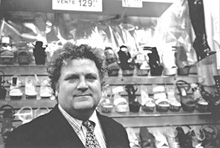Writer David McGimpsey is Certifiably funny

David McGimpsey asks students to write poems about their shoes.
Photo by Adrienne Ho
It’s the day after fire closed the legendary Cafe Olympico, and Dr. David McGimpsey seeks caffeine in a B-list Mile End coffee shop. He shoots a suspicious glance at the widescreen TV as The Larry Elder Show fills the room with deafening domestic conflict.
The talk-show circus is an apt soundtrack for a conversation with the pop-enthused McGimpsey, who’s currently teaching Creative Writing: Poetry.
His three books of poetry are delirious mash-ups of the lit canon (Yeats, Milton) and syndication purgatory (Beverly Hillbillies, Gilligan’s Island), with generous side orders of fries.
He’s published papers on Frank Sinatra, and his research interests include the history of miniature golf architecture. His summers are spent in fevered pursuit of roadside kitsch (statues of oversized fruit, etc.) and southern U.S. barbecue joints.
He plays guitar in Puggy Hammer, an “Alice Cooper meets Deep Purple” rock band formed with fellow Concordia English prof Jason Camlot. (Representative song titles: “It’s the End of the World and My Hair Smells Terrific,” “Milli Vanilli,” “I Was Made for Loving You and Your Roommate.”)
Then there’s Certifiable. McGimpsey’s recent collection of short fiction introduces an off-kilter alternate universe. Fonzie’s leather jacket is a cognitive entity (and, perhaps more fantastically, so is the jacket’s pen-pal, Christina Aguilera).
Batman annotates the New Testament: “I asked my butler Alfred, as he was setting down a bowl of Manhattan clam chowder in front of the batcomputer, what he thought of the first gospel writer…”.
A course syllabus warns, “Students will be familiarized with moments where the instructor will be wild-eyed and intent, like a rogue cop who’s come face to face with the kind of punk who ruined his faith in America.”
Born of “the sort of observations I’m always torturing my friends with,” Certifiable quietly delivers sinewy, finely crafted prose from behind the deceptively goofy bluster of Matlock references. And, yes, it’s extremely funny.
McGimpsey said in an interview, “My earliest writings tried to be serious and soulful and wounded and all those things that I thought were so poetically impressive — when you’re 19, you want to be wise, but that’s the one thing you can’t be. Slowly I realized that my voice was more in tune with the wisecracks I was making.”
“I hope to help my students discover their strengths, to learn the craft of writing so they can learn to write like themselves and not just imitate something they believe writing is supposed to be.
“Writing requires an apprenticeship that can be difficult and arduous — you cannot be a writing prodigy. People will go hear a child violinist, but nobody’s saying, ‘You know, there’s this great novel by a five-year-old....’
“I want my students to learn some respect for how difficult that apprenticeship can be, and also to give themselves a break, to accept their hard work as steps in the right direction and not put pressure on themselves to say everything right now.”
McGimpsey sneaks a look at the TV. “And that’s why I ask them to write poems about their shoes.”